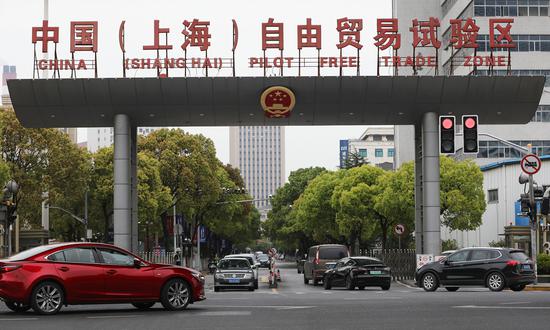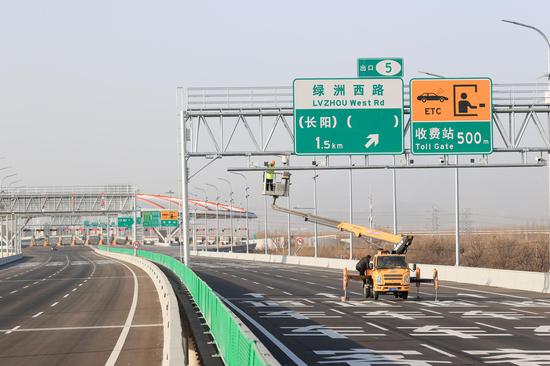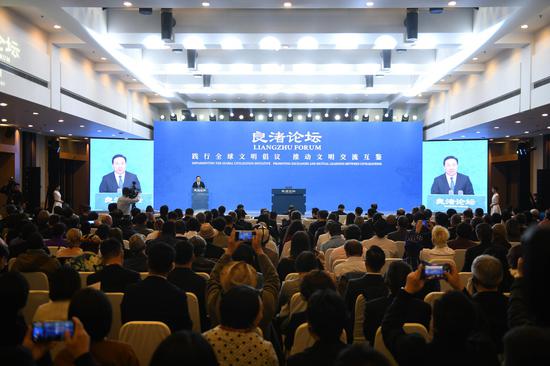
The main entrance of the China (Shanghai) Pilot Free Trade Zone located in the Pudong New Area (Photo: Yang Hui/GT)
China's State Council, the country's cabinet, on Thursday unveiled a comprehensive plan to promote the high-level institutional opening-up of the China (Shanghai) Pilot Free Trade Zone (FTZ) by aligning it with high-standard international economic and trade rules. The plan comes at a milestone moment of China's reform and opening-up journey, after Chinese leader inspected Shanghai.
The plan, which contains 80 measures in such areas as cross-border data transmission, financial opening-up and international cooperation on artificial intelligence (AI), underscores China's unswerving commitment to continue promoting opening-up and integrating into the global financial system, observers said.
They noted that the move would serve as a strong objection to certain countries' decoupling push and a fresh rebuttal to Chinese economy doomsayers.
A number of policies involving labor standards, intellectual property protection and state-owned enterprise reform also live up to the recognized standards of the Comprehensive Progressive Trans-Pacific Partnership (CPTPP), according to analysts.
If the Shanghai FTZ trailblazed in the reform, similar policies could likely be applied to other FTZs, paving the way for China's entry to the trans-Pacific trade pact amid a new stage of high-level opening-up, experts said.
The measures aim to build a national institutional demonstration zone for opening-up, and to explore new paths and accumulate new experience for comprehensively deepening reform and expanding opening-up.
"The measures are quite extensive in terms of the extent of opening-up. They clearly send a positive signal on China's resolve for further opening-up, which is quite important, taking into account the global economic slowdown and complicated geopolitical situation," Tu Xinquan, dean of the China Institute for WTO Studies at the University of International Business and Economics in Beijing, told the Global Times on Thursday.
Tu highlighted regulations on cross-border data management, which could contain sensitive and critical information that is key to national security.
In services trade, the plan allows financial institutions to transmit data overseas that is required for daily operation under the framework of the national cross-border data transmission security management system, read the plan.
With regard to the transmission of financial data abroad, regulators could take measures based on national security and prudential principles while ensuring the security of important data and personal information.
It also called on local regulators to study the issue of allowing asset management companies to carry out cross-border transfers of asset-backed securities.
The Shanghai FTZ will also be a pioneer in implementing high-standard digital trade rules, according to the plan. For example, it supports the Shanghai FTZ to formulate important data categories, based on a data classified protection system. Also, it supports the application of AI technology in a reliable, secure and responsible way. The FTZ authorities should also draw on international experience in researching and setting up an AI ethics and governing framework.
"The steps are bold in the finance and data fields. Against doubts and hype over the so-called 'Chinese economy malaise,' the plan is expected to stabilize market expectations and consolidate global investors' confidence in the Chinese market," Tian Yun, a veteran economist based in Beijing, told the Global Times on Thursday.
Tian explained that certain measures on financial services opening-up could allow foreign investors to invest in all kinds of yuan-denominated financial assets - not only bonds and securities but also others that could be traded, such as land and basic infrastructure.
"It equates to speeding up two-way capital flows and therefore is set to draw in more foreign capital," he noted.
Observers said the further reform of Shanghai's FTZ, adding to an array of opening-up moves announced this year, shows that China is taking concrete actions to push against decoupling, and it has become an important factor in promoting the development of the global economic order, rather than challenging it as some media outlets have claimed.
The Shanghai FTZ, established in September 2013, was the first of its kind in China, and it has been replicated across the country. China has so far established over 20 FTZs.
In October, China issued an overall plan for building a pilot FTZ in Northwest China's Xinjiang Uygur Autonomous Region.
"It is important that in the new stage of opening-up, the pilot reform in the Shanghai FTZ could be quickly duplicated by other FTZs. In such a way, the economic benefits could be maximized," Tu said.
According to Tian, the promotion of experience from the Shanghai FTZ across China would also lay a foundation for the country's accession to the CPTPP.
"China still has gaps in some standards related to the CPTPP. The Shanghai FTZ plan will help bridge such gaps in labor standards, SOE reform and government procurement," Tian said.
China has the willingness and capability to join the CPTPP, and the country has submitted documents for its accession to the pact, a Chinese senior official said in June.


















































 京公网安备 11010202009201号
京公网安备 11010202009201号